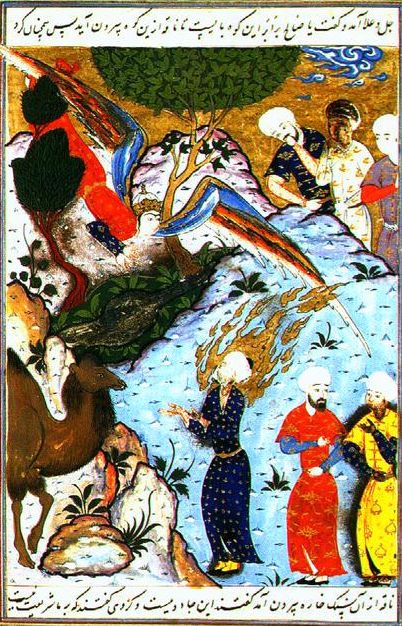.jpg)
ISLAM AND THE HERITAGE OF PREVIOUS RELIGIONS
According to Islamic belief, a prophet has been sent to every region and nation. They all conveyed the same faith, but the laws, that is, the rules of worship and jurisprudence, they brought might have differed. Just as a doctor might prescribe different medicines for the same illness at different times.
In a verse of the Qur'an, it is mentioned in meaning: "If We abrogate a verse or cause it to be forgotten, We bring forth one better than it or similar to it." (Al-Baqarah: 106)
So, did the Prophet Muhammad (peace be upon him) follow the laws of previous prophets after he was informed of his prophethood?

The Path of Guidance
According to most Islamic scholars, yes. A law that is established for a prophet remains valid until the Day of Judgment unless it is abrogated, that is, unless it is explicitly stated to be annulled.
There are several verses in the Qur'an that support this. Among them are the verses: "Those were the ones (prophets) upon whom Allah bestowed His guidance. So follow their guidance." (Al-An'am: 90) and "In their stories, there is certainly a lesson for those of understanding." (Yusuf: 111).
The Prophet Muhammad punished those who committed adultery in Medina. He said, "I am more deserving of reviving a sunnah that the Jews have abandoned."
In a hadith, it is stated: "I am ahead of everyone in doing what the Prophet Isa (Jesus) did (peace be upon him). Prophets are like brothers from the same father; their mothers are different, but their religion is one." The phrase "their religion is one" shows that they had the same faith, while "their mothers are different" indicates that their laws were different.
Two Conditions
There are two conditions for the laws of previous scriptures to be considered evidence:
1. It must be mentioned in the Qur'an and Hadith.
2. It must not have been stated as abrogated.
Therefore, the rulings in the Torah and the Bible, which are currently in the hands of Jews and Christians, are not considered evidence in Islam. The Qur'an states that these scriptures were distorted over time (Al-Ma'idah: 13-15). Now, it is not known which words in these scriptures are divine and which are human.
Islamic scholars with different opinions argue that the previous laws, in their current form, should now be applied as the Shari'a of Muhammad.
Indeed, the verse "We sent down the Book in truth, confirming the Scriptures that came before it, and as a guardian over them" (Al-Ma'idah: 48) indicates that the laws of the prophets, unless abrogated, are essentially a single consistent law.

Which Is Evidence?
In Islamic sources, some of the rulings of previous scriptures are mentioned, while others are not.
1. Some of those not mentioned have been understood as abrogated.
For example, in the Torah, camel and rabbit meat are forbidden. A pigeon can be sacrificed. The meat of the sacrifice is not eaten; it is burned. Divorce is prohibited in the Bible. The firstborn son receives a double inheritance in the Torah. Daughters do not inherit if there is a son. The mother is not an heir. Children born from a concubine do not inherit. The widow of a deceased man marries his brother, and their children are considered the children of the first husband. Islam abolished these rules.
2. Some of those not mentioned have been commanded similarly or identically.
The Ten Commandments in the Torah (honor your father and mother, do not kill, do not commit adultery, do not covet someone else's property or spouse, do not steal, do not bear false witness, do not make idols) are also mentioned in the Qur'an.
Avoiding intercourse with a menstruating woman, performing ghusl (full ablution) after menstruation and postpartum bleeding, and prohibiting the consumption of carrion and tattooing are also commanded in Islam. Collective responsibility in unsolved murders (qasamah), rejecting the paternity of a child born from adultery (li'an) are also recognized in Islam. The veil and covering of the head by women are commanded in the Torah and the Bible as well. Polygyny, which is accepted in the Torah and the Bible, is also lawful in Islam but is limited to four wives. Jihad for the sake of religion is commanded in the Torah and the Bible.
3. Some of those mentioned have been abrogated.
The Qur'an reports that the Sabbath (Saturday) was considered sacred in the Torah, but this ruling has been abrogated. Monasticism, that is, refraining from marriage and devoting oneself solely to worship, has been prohibited.
According to the story of the Prophet Yusuf (Joseph, peace be upon him) in the Qur'an, the penalty for theft among the Israelites was for the thief to be taken into custody. Greeting one another was done by prostrating. Islam abolished these practices.
On the sacred Mount Sinai, the Prophet Musa (Moses, peace be upon him)) was commanded to remove his shoes (Taha: 12). In a hadith, the Prophet Muhammad said, "Do not imitate the Jews. Pray in your shoes (or with your feet covered)."
4. Some of those mentioned have been commanded.
The Qur'an reports that wudu (ablution), salah (prayer), fasting, zakat (obligatory almsgiving), and sacrifice existed among previous nations. However, their conditions and forms may differ.
The Qur'an mentions that the punishment for intentional killing and wounding in the Torah was retaliation (Qisas). These rulings are also valid in Islam.
The Qur'an states that the unbelieving son of the Prophet Nuh (Noah, peace be upon him) was not considered part of his family. In Islam, a non-Muslim child does not inherit from a Muslim father.
The Prophet Salih (Saleh, peace be upon him) allocated water from the earth, one day for the miraculous she-camel and another day for the people (Al-Qamar: 28). In Islam, shared property is used in a similar way.

Circumcision for men is inherited from previous prophets.
The Prophet Yusuf (Joseph) asked the Pharaoh to appoint him as the treasurer. The permissibility of taking a position or office from non-Muslims is based on this.
The Prophet Sulaiman (Solomon, peace be upon him) inherited the throne of his father, the Prophet Dawud (David, peace be upon him). This is evidence for the legitimacy of monarchy.
The Prophet Yusuf said that whoever finds the lost goblet of the king will receive a reward of a camel load and guaranteed this himself. This is evidence for surety.
The Prophet Ayyub (Job, peace be upon him) had sworn to hit his wife with a hundred lashes for a certain reason. Later, he was commanded to fulfill his oath by taking a bunch of (hundred) sticks and hitting her once, thus fulfilling his oath. This is evidence for legal stratagems (Hiyal).
The verse " O Dawud, We have made you a vicegerent on earth, so judge between people with justice" is evidence for the existence of a caliph and his role in adjudicating disputes.
One night, a flock of sheep entered a vineyard and caused damage. The victim came to the Prophet Dawud and complained about the owner of the sheep. Dawud ruled that the sheep be given as compensation to the aggrieved party. The Prophet Sulaiman ruled that the sheep be handed over to the victim to benefit from their yield until the vineyard was restored, after which the sheep would be returned. This is evidence for the principle that one legal opinion does not invalidate another and for the appeal and review of court rulings.
When the divine punishment that the Prophet Yunus (Jonah, peace be upon him) had warned his people of was delayed, he left and boarded a ship. When the ship faced turbulent waters, the sailors said, "There is a runaway slave among us; let's cast lots to identify him." When the lot was cast, it fell upon Yunus, and they threw him into the sea, where a fish swallowed him. This is evidence for the permissibility of casting lots.
When Ashab al-Kahf (the People of the Cave) awoke after 300 years, one of them was given money and sent to the city to buy food. This is the basis for the contract of agency (Wakalah).
Önceki Yazılar
-
“FASTING WAS MADE OBLIGATORY ALSO UPON THOSE BEFORE YOU”25.02.2026
-
WHAT WAS THE LAW OF THE OTTOMAN EMPIRE?18.02.2026
-
WOMAN IN THE EASTERN WORLD11.02.2026
-
THE OTTOMAN DYNASTY OWES ITS LIFE TO A WOMAN4.02.2026
-
THE WATER OF IMMORTALITY IN THE “LAND OF DARKNESS”28.01.2026
-
THE WORLD LEARNED WHAT FORBEARANCE IS FROM SULTAN MEHMED II21.01.2026
-
THE RUSH FOR GOLD14.01.2026
-
TRACES OF ISLAM IN CONSTANTINOPOLIS7.01.2026
-
WHO CAN FORGIVE THE KILLER?31.12.2025
-
WHEN WAS PROPHET ISA (JESUS) BORN?24.12.2025